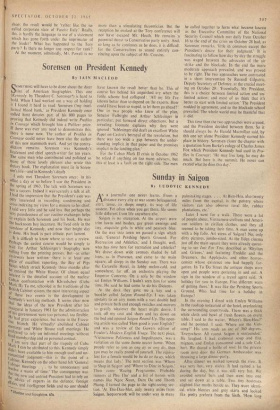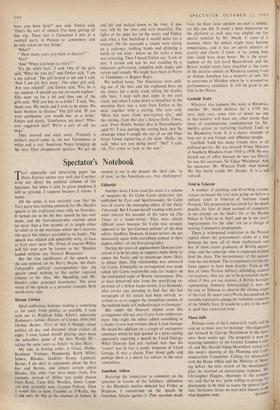Sunday in Saigon
KENNEDY
Aa journalist one never learns. From a distance every city at war seems beleaguered. alert, tense, its shops empty, its way of life austere. Yet often when you get there, life seems little different from life anywhere else.
Saigon is no exception. At the airport were trim lawns and bushes, gay green awnings and tiny, exquisite girls in white and peacock blue. On the way into town we passed a sign which said, 'General Pershing Sports Ground. For Recreation and Athletics,' and I thought, well, who has lime here for recreation and athletics? We drove down wide avenues. shaded by tall trees, as in Provence, and came to the main square, all sleepy in the Sunday sun. There was the Caravelle Hotel, its lobby melon-cold, and somewhere, far off, an orchestra playing the Emperor Concerto. On a sofa by the window sat Emlyn Williams. I hadn't seen him for some time. He said he had come to do his Dickens.
At the desk they gave me a key and a booklet called Saigon Round-Up. I was taken upstairs to an airy room with a vast double bed and private bath and enough switches and mirrors to gratify whatever the heart might desire. I took off my coat and shoes and lay down on the bed and opened Saigon Round-Up. The open- ing article was called 'How good is your English?' and was a review of the Gowers edition of Fowler's Modern English Usage. The next piece, 'Vietnamese Politeness and Impoliteness,' was a variation on the same theme nearer home. 'When people refer to you as ong ay or ong do, then ypu may be really proud of yourself. The equiva- lent for a female would be ba do or ba-ay, which means that lady.' The next section was 'Where to Shop in Saigon' and 'Where to Dine in Saigon.' Then came 'Racing Programme. Probable runners at Phu Tho' and a list of horses with names like Ngoc Xuan, Dam Do and Thonh Phung. I turned the page to the sight-seeing sec- tion. 'At Thu-Dau-Mot, only twenty miles from Saigon, lacquerwork will be under way in many painstaking stages. . . . At Bien-Hoa, also twenty miles from the . capital, is the pottery where visitors can also observe rural life, rubber plantations, etc.'
Later I went for a walk. There were a lot of people about, Vietnamese civilians and Ameri- can soldiers in civilian clothes, and they all seemed to be taking their time. A man'came up with a big folio. Art views of Saigon? No, only dirty pictures, jumbo-sized. At the Eden cinema just off the main square they were already queue- ing to see Jusi For You, described as 'Rhythm and Greens,' and featuring Freddie and the Dreamers, the Applejacks, and other horror- comics whose existence one had happily for- gotten. In Tu Do Street the antique shops were open and people were pottering in and out. A sign in the window of a travel agent said, 'A holiday for you in Europe. Five different ways of getting there.' It was like the Pershing Sports Ground. Who had time for a holiday in Europe?
In the evening I dined with Emlyn Williams in the rooftop restaurant of the hotel, overlooking the surrounding countryside. There was a thick white cloth and bowl of fresh flowers on every table. I said to the waiter, 'Where's Bien-Hoa?' and he pointed. I said, 'Where are the Viet- cong?' His arm made an arc of 360 degrees. 'Everywhere. All round. Saigon is surrounded.' He laughed. I had crabmeat soup and filet mignon. and Emlyn consommé and a sole Col- bert. We shared a bottle of rose. In the private room next door the German Ambassador was throwing a large dinner-party. After dinner we walked towards the river. It was very hot, very sticky. It had rained a lot during the day, but it was still very hot. We avoided several bars and then went into one and sat down at a table. Two tiny hostesses alighted like moths beside us. They wore identi- cal white blouses and grey skirts and looked like pretty prefects from the Sixth. 'How lone
have you been here?' one said. Emlyn said, 'That's the sort of remark I've been getting all this trip. There was a Chinaman 1 met at a cocktail party in Penang or somewhere and he only asked me two things.'
'What?'
' "How many years yqu been in theatre?"' 'Yes?'
. 'And "When you hope to retire?"'
'It's the white hair,' I said. One of the girls said, 'What do you do?' and Emlyn said, 'I am a sea captain,' The girl looked at me and I said, 'And I am his first mate.' The other girl said, 'Are you related?' and Emlyn said, 'Yes, he is my nephew—I should say my favourite nephew.' This went on for a bit and then one of the girls said, 'Will you buy us a drink?' I said, 'No, thank you. My uncle and I wish to be alone. We have business to discuss.' The girl said. 'If you were gentlemen, you would buy us a drink.' Ennlyn said nicely, 'Gentlemen, my dear? Who- ever. suggested that? We're a pair of old sea dogs.'
They snorted and went away. Presently a ,military patrol came in, six wee Vietnamese in white and a vast American Negro bringing up the rear. They disappeared upstairs. We got up and left and walked down to the river. It was very still by the river and very beautiful. The lights of the ships lay on the water, and Emlyn said what a fine backdrop it would make for a musical. On the quayside a couple were sitting on a rush-mat, holding hands and drinking a bottle of red wine: below on the rocks a man was urinating. Then I heard Emlyn say, 'Look at this.' I turned and saw he was standing by a miniature golf-course, complete with slopes and curves and tunnels. We might have been in Nairn or Llandudno or Bognor Regis.
We walked home. The Americans were spill- ing out of the bars and the orphaned boys on the streets did a brisk trade selling the drunks silly hats. I slept well that night in my cool room, and when I came down to breakfast in the morning there was a note from Emlyn at the desk, together with a cutting. The note said, 'More hot news from war-scarred city,' and the cutting, from that day's Saigon Daily Times, said, 'Peter Rabbit Author dies in Massachusetts aged 91.' I was putting the cutting back into the envelope when I caught the eye of an old Fleet Street friend registering at the desk. 'Hullo,' he said, 'what are you doing here?' Me?' I said, `oh, I've come to look at the war.'































 Previous page
Previous page